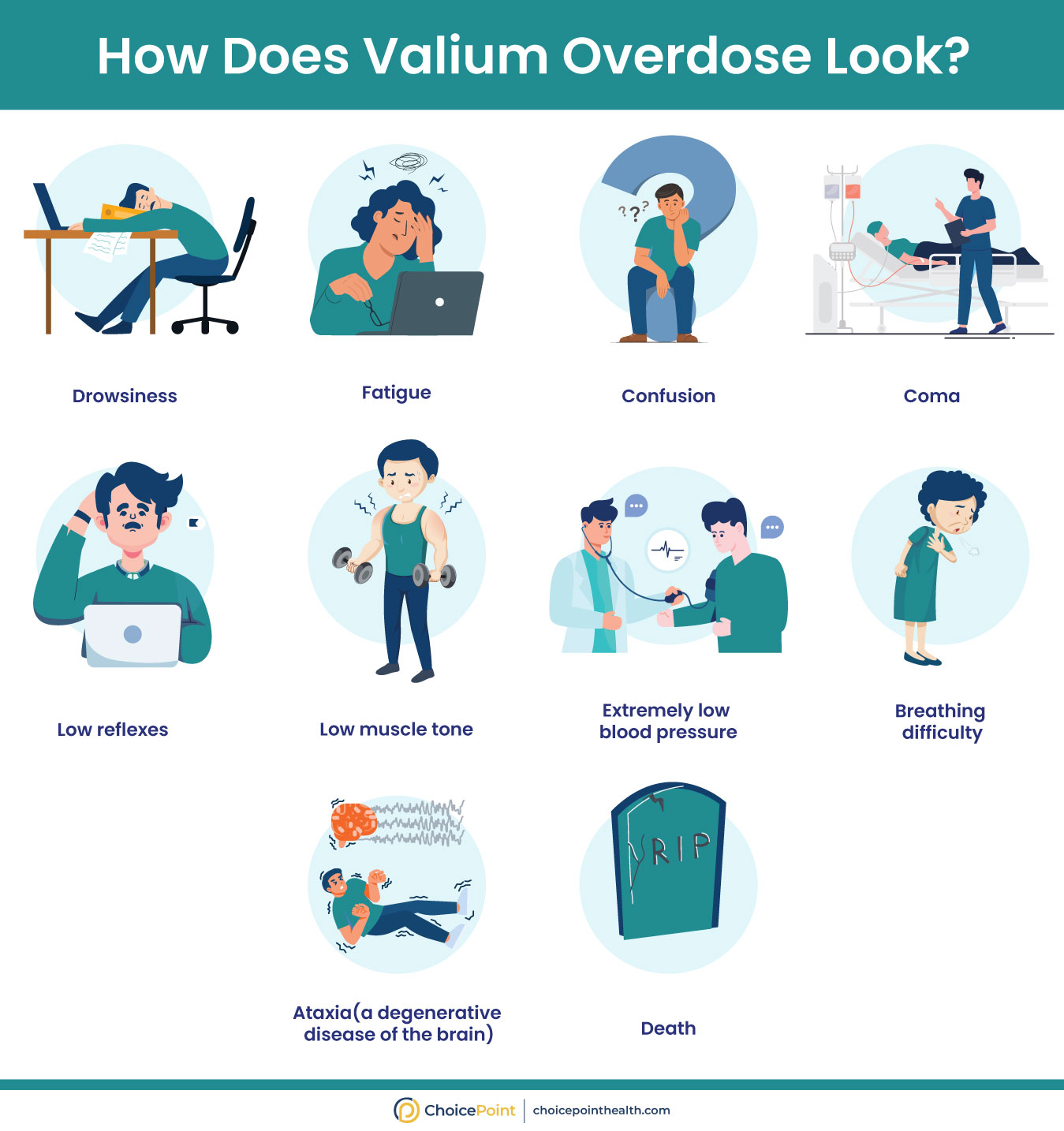Asking for Is Valium an opioid? No! Valium is neither an opioid nor a narcotic. It comes under the fast-acting Benzodiazepines class known as Diazepam or, in simple terms, sedative-hypnotics. According to the DEA, Valium is a Schedule IV drug, so it has a high potential for addiction. This article explains explicitly:
- What exactly is valium
- Why Valium is prescribed
- What risky side effects does valium pose if abused
- How will you alleviate valium addiction
- Potential options for treatment
ChoicePoint provides addiction treatment for all prescription drug addictions, including valium. Contact 844.445.2565 to schedule an appointment to ensure you or your loved one uses Valium under medical supervision!
Table of Contents
How Valium Became a Part of Our Lives
Valium has become a casual part of our lives. We often see valium discussed on TV, in movies, and in pop culture, leading people to use it as a recreational substance, not knowing the harmful effects and addiction.
One of our patient of valium told their experience as. “An indescribable feeling. Just laying in a bathtub on Valium OD’ed is the ultimate relaxation trip. You won’t remember it, but you can’t forget it.
One of our patient of valium told their experience as. “An indescribable feeling. Just laying in a bathtub on Valium OD’ed is the ultimate relaxation trip. You won’t remember it, but you can’t forget it.
Valium was established in the early U.S. Drug and Food Authority approved it in 1963 after librium. Since then, it has been used for various treatment options. But for the latest part, people often misuse it for recreational purposes while not knowing the side effects and its addiction potential.
Is Valium an Opioid? Why Is it Prescribed?
It’s not an opioid but rather a benzodiazepine. Like other benzos, Valium works by depressing CNS and thus lowering brain activity. It is an FDA-approved medication used to treat multiple medical conditions, such as:
- Alcohol withdrawal
- Anxiety
- muscle spasms
- Seizures
- sleep disorders
Valium triggers GABA receptors to inhibit brain activity. Valium is also used before or after medical surgeries as a sedative to ease pain and cause numbness. However, uncontrolled and unsupervised use of valium can lead to addiction, side effects, and withdrawal symptoms if tried quitting cold turkey.

Did you know? Valium has a black box warning from the FDA that warns doctors and patients of the potential side effects and addiction to it!

Did you know? Valium has a black box warning from the FDA that warns doctors and patients of the potential side effects and addiction to it!
Side Effects of Valium Misuse
The worst part of valium misuse includes impaired motor coordination and several other side effects that appear from time to time, such as:
- Drowsiness or sleepiness
- Dizziness
- The feeling of spinning
- Loss of balance
- Paranoia
- Restlessness
- Irritability
- Problems with memory
- Slurred speech
- Blurry vision
- Rash or itching
- Sexual problems
The best possible way to avoid these symptoms is to adhere strictly to rehab protocols that include medical detox and psychotherapy.
Signs and Symptoms You Are Getting Addicted to Valium
Valium addiction begins with a lack of enough will or useless efforts to quit the use. When someone gets addicted, according to DSM-5 criteria, they might show signs such as:
- Inability to fulfill obligatory duties of work, school, and personal life.
- Showing withdrawal symptoms or panic if not getting valium on time.
- Unable to control the use of valium, increased tolerance, and higher dose requirements.
- Euphoria, extreme mood fluctuation, slowed response, and slurred speech.
Moreover, prolonged use and factors such as genetics, environment, underlying mental condition, and physical health contribute to the slow development of addiction.

Signs Of A Valium (Diazepam) Overdose
ChoicePoint Free Addiction Assessment – Take Control
We know that it is hard to tell someone if you or your loved one is struggling with valium addiction or confused about whether valium is an opioid or not. Take our self-addiction assessment on addiction to help yourself understand your condition, or get in touch with our 24/7 expert consultant for guidance!
Overcoming Valium Addiction With ChoicePoint
Valium is the most addictive from its class of benzo drugs as it has the longest tenure of effect among all. Whatever therapeutic benefits valium provides, prolonged usage or misuse always comes with inconvenient stages of addiction that could only be solved by treatment.
One Valium user said, “ Benzo use is not a joke. Who benefits from it? It’s better to look to different methods to clear anxiety. The price is too high to pay with prescription drugs.
One Valium user said, “ Benzo use is not a joke. Who benefits from it? It’s better to look to different methods to clear anxiety. The price is too high to pay with prescription drugs.
Generally, research-based benzodiazepine addiction treatment involves:
Treating Valium Addiction and Dependence with Dual Diagnosis
A person usually has co-occurring disorders if they get addicted to valium as they are prescribed for treatment of mental illnesses such as PTSD, Anxiety, etc. Treating both, i.e., substance use disorder and mental illness, will require comprehensive treatment through dual diagnosis treatment.
Alleviating Valium Withdrawal Symptoms with Medication-Assisted Detox
Whether someone develops addiction or dependence, the implications of valium use always come with withdrawal symptoms such as:
- Tremors
- Cramping
- Vomiting
- Sweating
- Numbness
- Seizures
- Tingling in extremities
- Muscle pain and tension
- Sensitivity to light, noise, and touch
- Anxiety
- Irritability
- Hallucinations
There is an effective strategy to cope with valium withdrawal through FDA-approved medication-assisted detox that includes a substitute for valium dependence and withdrawal treatment through
- Flumazenil treating valium addiction
- Buspirone for treating mental illness, i.e., anxiety disorders
- Buprenorphine such as Subutex Suboxone if there’s polysubstance disorder, i.e., opioid and benzodiazepine
However, these medications are not for solo use. Only experts with DEA certifications can help manage dose and withdrawal and alleviate symptoms through 24/7 surveillance. Detox alone does not last long if the psychological and behavioral effects of valium are not met with a hard fist through psychotherapy and counseling.
Benzodiazepines Psychological Catharsis with Psychotherapy
Benzo withdrawal is notoriously hard on body and mind, and the only way to achieve long-term recovery is with the help of behavioral therapy such as:
- Cognitive behavioral therapy (CBT) is used to overcome triggers, assist in new helpful behavior, and build a positive mindset.
- Dialectical Behavior therapy (DBT) brings brain abilities to normal functioning without exaggeration and the high euphoric effects of valium.
Behavioral therapies are a perfect way of treating the underlying cause of valium dependence. They are an alternative strategy to cope with new skills, overcome stress, and treat mental health conditions that lead to valium use and addiction.
Guarding Sobriety with Addiction Counseling
After detox, there comes the daunting task of maintaining sobriety and avoiding societal triggers. As valium slows the brain, psychosocial effects persist for a considerable time. To alleviate them, psychiatrists will provide counseling in the form of
They comprise one-on-one sessions, family interactions, and peer-fellow experiences to improve confidence and face social exclusion with a positive and skillful mindset.
Contact ChoicePoint experts for mindful counseling for a new beginning 844.445.2565!

Did you know? Nearly 107,941 drug overdose deaths occurred in 2022 involving benzodiazepines, including Valium!

Did you know? Nearly 107,941 drug overdose deaths occurred in 2022 involving benzodiazepines, including Valium!
Frequently Asked Questions About Valium
Just like “Is valium an opioid?” people have related queries:
What Should You Know Before Taking Valium?
Keep in view specific cautions such as:
- Valium has a black box warning, which means it is highly addictive
- Valium should not be used during pregnancy
- Long-term Valium use causes physical and emotional dependence
- It may interact with other medicines and drugs, such as opioids and alcohol, causing profound sedation, respiratory depression, coma, and death.
When Should You Not Give Valium?
You should avoid taking valium if you have certain medical conditions such as:
- Respiratory disease
- Liver and kidney failure
- History of substance use disorder
- Allergic to diazepam
What Is the Most Common Side Effect of Diazepam (valium)?
The most common and frequently occurring side effects of diazepam include:
- Profound sedation
- Sleepiness
- Drowsiness
- Dizziness
- Fatigue
- Impaired vision
- Unsteadiness
What to Avoid When Taking Diazepam?
Any medication or drug that could increase diazepam interaction with the mind and its effect should be avoided, such as
Combining it with other drugs can be fatally dangerous, and immediately seek help from professionals 844.445.2565.
Is Valium Addictive?
As a mind-altering drug, valium is highly addictive. It comes with an FDA black box warning for its potential addictive and dependency effects in the form of physical, psychological, emotional, and spiritual. So, always seek professional advice before taking or, if accepted, seek immediate help! 844.445.2565
How Long Does Valium Last?
According to research, valium has a half-life of 48 hours. Valium actions start according to dosage type and may persist from 4 to 12 hours as a peak. Some people with weak metabolism may respond to valium even longer. Valium taken intravenously starts as soon as 1-3 minutes and oral ingestion takes somewhere between 15-60 minutes to create its effects.
Medical Disclaimer:
ChoicePoint aims to improve the quality of life for people struggling with substance use disorder and mental health issues. Our team of licensed medical professionals research, edit and review the content before publishing. However, this information is not intended to be a substitute for professional medical advice, diagnosis, or treatment. For medical advice please consult your physicians or ChoicePoint's qualified staff.









